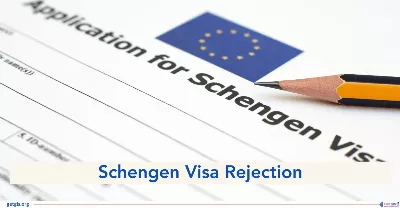Schengen Visa Rejection: Reasons and Tips for 2025-26
Updated On
-
Copy link
-
-
Learn the main reasons for Schengen Visa Rejection in 2025-26, including incomplete applications, weak finances, and travel inconsistencies. With rejection rates around 15%, find tips to improve approval chances and avoid delays.
Limited-time offer : Access a free 10-Day IELTS study plan curated for you

Table of Contents
For many Indians planning to travel to Europe, a Schengen visa opens doors to 29 countries with just one document. However, the��Schengen Visa rejection��rate for Indian applicants has remained a concern, with around 15% refusals recorded in 2024. Common reasons include incomplete documents, insufficient financial proof, or doubts about travel intent.��
A rejected application not only delays travel plans but also affects future visa prospects. This blog will guide you through the main causes of Schengen Visa rejection and offer tips to improve approval chances in 2025-26.
Top Reasons for Schengen Visa Rejection
Navigating the Schengen Visa application process can be a daunting task, and the fear of rejection often looms large for aspiring travellers. While the Schengen Area, spanning 27 European countries, offers passport-free travel and a plethora of cultural experiences, securing the coveted visa isn't always guaranteed.
Let’s understand the reasons for Schengen Visa rejection and how to avoid them.
1. Incomplete Visa Application
One of the leading causes of Schengen Visa Rejection is an incomplete or incorrectly filled application. Missing documents like a valid passport, proof of stay, or travel itinerary can immediately raise red flags. Even minor mistakes or inconsistencies between documents may result in denial.
2. Insufficient Financial Requirement
Applicants must prove they can financially support themselves throughout their stay in the Schengen Area. Bank statements, salary slips, or other financial records are commonly required. If the funds do not meet the minimum threshold or the documents are unclear, the visa is likely to be refused.
3. No Travel Insurance
Travel insurance that covers medical emergencies and repatriation is mandatory for a Schengen visa. Submitting an inadequate policy or failing to provide insurance documents altogether can result in rejection. The policy must meet Schengen guidelines for it to be considered valid.
4. Suspicious Travel Itinerary
A detailed and realistic itinerary is necessary to convince visa officers of genuine travel intent. If your plan looks vague, inconsistent, or implausible, authorities may suspect false intentions. This lack of clarity often results in Schengen visa rejection.
5. Previous Visa Violations
Past overstays or breaches of visa conditions can greatly harm future applications. Any history of violating immigration laws raises doubts about compliance. Providing a clear purpose for your visit, tourism, business, study, or medical treatment, becomes essential to rebuild trust.
6. No Proof of Accommodation
Applicants must show confirmed hotel bookings or an official invitation letter from a host in the Schengen Area. Without such documents, authorities may assume the trip is not genuine. This missing detail is a frequent reason for visa refusal.
7. Weak Ties to Home Country
Providing strong ties to the applicant’s home country, like employment, family commitments, or property ownership, assures the authorities of their return. A weak connection to your home country raises the suspicion of overstaying, resulting in rejection.
8. Passport Invalidity
Passports that do not meet Schengen requirements often lead to automatic refusal. Issues include having less than three months’ validity after departure, fewer than two blank pages, being over ten years old, or being damaged. A valid, well-maintained passport is non-negotiable.
9. Providing Inadequate or False Documents
Submitting incomplete or falsified documents is among the most serious mistakes. Fake bank statements, altered travel bookings, or misrepresentation of identity result in immediate rejection.
10. Criminal Record or Security Concerns
Applicants with a criminal history or security-related concerns face a higher chance of refusal. Schengen states prioritize the safety of residents and visitors, and past actions carry significant weight in decision-making. A clean record helps strengthen the application.
Also Read:��Schengen Region Countries: Complete Guide to Visa Types, Requirements, and Travel Info (2025-26)
Strategies to Avoid Schengen Visa Rejection
Let's delve into expert strategies for avoiding Schengen visa rejection, maximizing your chances of approval, and setting the stage for an unforgettable European adventure.
- Plan and Prepare Thoroughly:��Start the application process well in advance, allowing ample time to gather documents and address any potential issues.
- Seek Guidance from Experts:��Consider consulting immigration specialists or visa consultants like ����ÿ�մ���, who can provide personalized advice and assistance throughout the process.
- Understand Visa Requirements:��Thoroughly review the visa requirements for your specific nationality and purpose of travel. Ensure you meet all eligibility criteria.
- Complete the Application Carefully:��Follow the application instructions meticulously, providing accurate and complete information. Proofread your application multiple times to eliminate errors.
- Provide Supporting Documentation:��Assemble all required documents as specified in the guidelines. Ensure documents are valid, translated if necessary, and presented in a clear and organized manner.
- Attend the Interview Confidently:��If required, prepare for the visa interview by practicing common questions and demonstrating your knowledge of the purpose of your trip.
- Maintain a Positive Attitude:��Approach the application process with a positive mindset and address any concerns proactively. Demonstrating professionalism and cooperation can enhance your chances of success.
By following the above-mentioned guidelines and seeking expert assistance if needed, you can navigate the application process with confidence and overcome any hurdles that may arise.
Explore:��Schengen Tourist Visa from India in 2025: Types, Requirements, Process
What to Do in Case of Schengen Visa Rejection?
Receiving a Schengen Visa rejection can be a disheartening experience, especially when you've meticulously planned your European adventure. However, it's important to remember that rejection doesn't necessarily mean the end of your travel aspirations. Instead, it's an opportunity to reassess your application, identify areas for improvement, and strategize for a successful re-application.
Taking Action After Rejection
Once you've identified the reasons for rejection, take the following steps to strengthen your re-application.
- Gather Additional Documentation:��If insufficient documentation was cited as a reason for rejection, gather the required documents and ensure they are complete, valid, and translated if necessary.
- Address Financial Concerns:��If proof of financial means was an issue, provide additional evidence of your ability to cover travel and accommodation expenses, such as bank statements, salary slips, or sponsorship letters.
- Clarify Purpose of Travel:��If the purpose of your travel was unclear, provide more detailed documentation and explanations. For business trips, include a detailed itinerary and a letter of invitation from the host company. For tourist visits, provide a comprehensive itinerary, accommodation reservations, and proof of travel arrangements.
- Demonstrate Ties to Home Country:��Reinforce your intention to return to your home country by providing evidence of strong ties, such as property ownership, employment contracts, or family commitments.
Re-application Strategies
If you're asking yourself, "Can I get a Schengen visa after rejection?", fear not! This section provides valuable insights to help you overcome this hurdle and secure your visa. When re-applying for a Schengen Visa, follow these strategies to increase your chances of success.
- Start Early:��Initiate the re-application process well in advance of your intended travel date to allow ample time for processing and to address any potential issues.
- Attend the Interview with Confidence:��If required, prepare for the visa interview by practicing common questions, demonstrating your knowledge of the purpose of your trip, and maintaining a positive and professional demeanour.
- Address Previous Rejection:��Acknowledge the previous rejection and explain the steps you've taken to address the reasons for denial. Show that you've learned from the experience and are a responsible traveller.
Check Out:��Guide to Reapplying for Schengen Visa After Rejection in 2025
What are the Schengen Countries?
The Schengen Area is a group of 27 European countries that have agreed to allow passport-free travel between their borders. This means that travellers can move freely between these countries without having to go through border controls. The Schengen Area is one of the largest and most popular free travel areas in the world.
Member Countries of the Schengen Area
As of 2025, the following countries are members of the Schengen Area, fostering seamless travel and cooperation. It continues to symbolize a collective commitment to open borders, harmonized policies, and collaborative efforts.
- Austria
- Belgium
- Croatia
- CzechRepublic
- Denmark
- Estonia
- Finland
- France
- Germany
- Greece
- Hungary
- Italy
- Latvia
- Lithuania
- Luxembourg
- Malta
- Netherlands
- Poland
- Portugal
- Slovakia
- Slovenia
- Spain
- Sweden
- Bulgaria
- Romania
- Iceland
- Norway
- Switzerland
- Liechtenstein
Benefits of Travelling in the Schengen Area
Before beginning your exciting journey through the Schengen Area, let's explore the myriad benefits that await you, from experiencing diverse cultures and stunning landscapes to seamless travel and historical treasures. These benefits include,
- Seamless Travel:��The Schengen Area eliminates border controls between member countries, allowing over 450 million residents and visitors to travel freely without the hassle of passport checks.
- Cultural Diversity:��With 29 member countries, the Schengen Area encompasses a rich tapestry of cultures, languages, and traditions, offering travellers a diverse range of experiences and perspectives.
- Tourist Friendly:��The Schengen Area is a major destination for tourism, attracting over 450 million tourists each year.
Suggested Reading:��How to Write a Cover Letter for a Schengen Visa
Embark on Your European Dream with ����ÿ�մ���!
Navigating the intricacies of visa applications can be a daunting and time-consuming task, particularly when facing the possibility of Schengen visa rejection. While understanding the reasons for denial and implementing strategies for improvement can significantly enhance your chances of success, having expert guidance by your side can make the process smoother and more efficient.
That's where������ÿ�մ���, the leading immigration consultancy firm, steps in. With our specialized expertise, personalized support, and proven track record of success in securing Schengen Visas, ����ÿ�մ��� is your ideal partner in overcoming visa hurdles and turning your European travel aspirations into reality.
Quick Links for You:
- Tags
- Travel
Limited-time offer : Access a free 10-Day IELTS study plan curated for you

Frequently Asked Questions
How can I ensure my travel insurance meets Schengen visa requirements?
What are some types of Schengen visas?
- Airport Transit Schengen Visa (A-type): This visa is for travelers who need to pass through the Schengen area to reach a non-Schengen country.
- Short-Stay Schengen Visa (C-type): This visa is for travelers who intend to stay in the Schengen area for up to 90 days in any 180-day period. s.
- Long-Stay Schengen Visa or National Visa (D-type): This visa is for travelers who intend to stay in the Schengen area for more than 90 days up to 1 year for work, study, or family reasons.
What is the Schengen visa fee?
Who is eligible for Schengen visa?
How much bank balance do I have to show for a Schengen visa?





